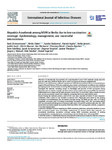2020-12-20Zeitschriftenartikel
Hepatitis A outbreak among MSM in Berlin due to low vaccination coverage: Epidemiology, management, and successful interventions
Zimmermann, Ruth
Faber, Mirko
Dudareva, Sandra
Ingiliz, Patrick
Jessen, Heiko
Koch, Judith
Marcus, Ulrich
Michaelis, Kai
Rieck, Thorsten
Ruscher, Claudia
Schilling, Birte
Schumacher, Jakob
Sissolak, Dagmar
Thoulass, Janine
Wenzel, Jürgen J.
Werber, Dirk
Sagebiel, Daniel
Objectives
To describe the characteristics of a large hepatitis A virus (HAV) outbreak among men who have sex with men (MSM) in Berlin and to assess the impact of measures implemented.
Methods
Cases of laboratory-confirmed, symptomatic HAV infection notified in Berlin, Germany between August 2016 and February 2018 were analysed using routine and enhanced surveillance data including genotyping results. Several studies involving different groups of participants were conducted to further investigate the outbreak, including surveys on knowledge and practices of HAV vaccination among physicians and vaccination coverage and determinants of vaccination status among MSM. The measures implemented were categorized by target group in a Gantt chart. To assess their impact, health insurance data on HAV vaccination uptake were analysed, comparing Berlin and other federal states.
Results
During the outbreak period, a total of 222 cases were reported (of which 91 were sequence-confirmed), with a peak in case numbers in January 2017. Physicians were aware of the existing vaccination recommendations, but vaccination coverage among 756 MSM was low, with 32.7% being completely vaccinated and 17.3% being incompletely vaccinated before 2017. HAV vaccination before 2017 was associated with being born in Germany (odds ratio 2.36) and HIV-positive (odds ratio 1.80). HAV monovalent vaccination uptake increased by 164% from 2016 to 2017 among males in Berlin, compared to 7% in other federal states.
Conclusions
Multiple measures targeting the MSM community, physicians, and public health to increase HAV vaccination uptake were successfully implemented. To prevent future HAV outbreaks, we recommend monitoring vaccination coverage among MSM, promoting awareness of existing recommendations among physicians, and ensuring access for foreign-born and young MSM.

